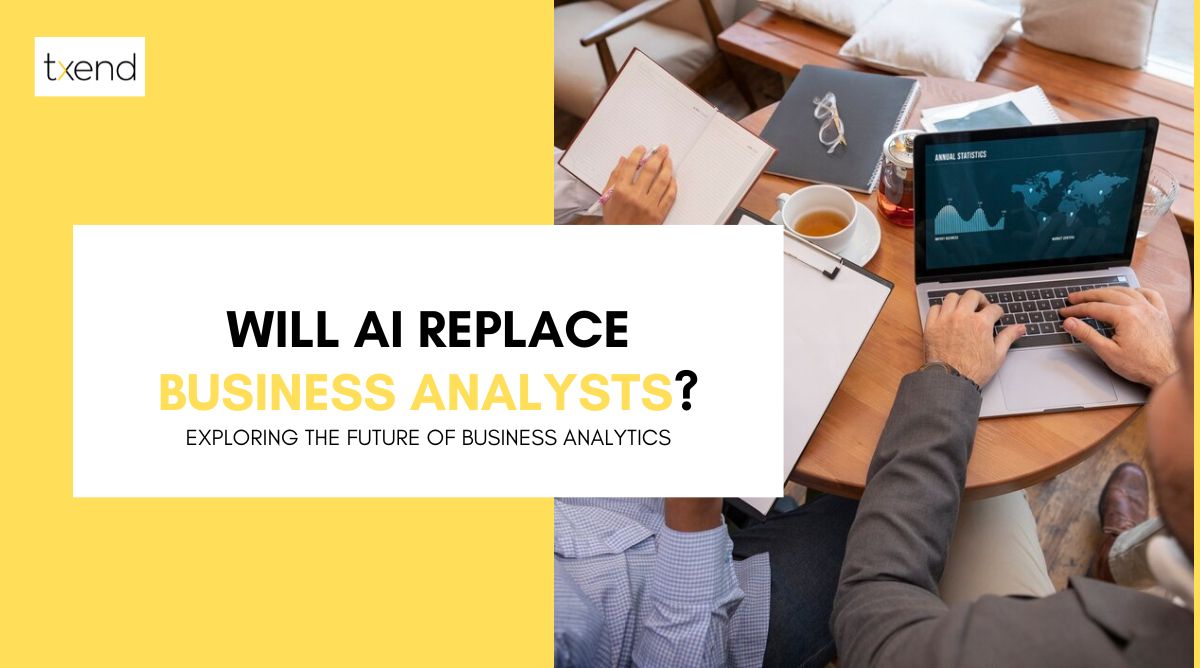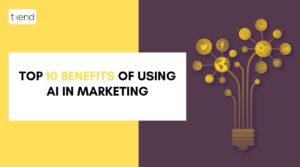In the ever-evolving landscape of data analysis and business intelligence, the rise of Artificial Intelligence (AI) has sparked a compelling question: “Will AI replace Business Analysts?” As organizations increasingly harness the power of AI for data-driven decision-making, it’s essential to explore the intricacies of this transformative relationship.
In this article, we embark on a journey to unravel the dynamic interplay between AI and Business Analysts, shedding light on the evolving roles, challenges, and opportunities that lie ahead.
Come explore with us the business analytics of the future, when humans and machines work together to fully realize the potential of data-driven insights.
Key Takeaways
- “Understanding business analysis involves examining, evaluating, and improving processes and systems to drive business success.”
- Artificial intelligence (AI) is the computer emulation of human intellectual processes, which usually include learning, thinking, solving problems, and making decisions.
- AI could change the role of the business analyst by automating routine tasks, enabling more strategic decision-making, and fostering innovation through data-driven insights.
- Selecting the most suitable AI tools tailored to your specific requirements is paramount for success.
- In the ever-evolving landscape of data analysis and business intelligence, the rise of Artificial Intelligence (AI) has sparked a compelling question: “Will AI replace Business Analysts?”
Understanding Business Analysis:
“Business analysis” refers to the process of evaluating an organization’s operations, processes, and systems to identify problems, opportunities, and solutions for achieving business goals.
It involves assessing data, conducting research, and collaborating with stakeholders to make informed decisions and drive improvements within an organization.
Business analysts play a crucial role in this process by bridging the gap between business needs and technology solutions, helping organizations operate more efficiently and effectively.But due to AI people are concern about Will AI replace business analyst?
What is artificial intelligence (AI)?
In computer science, artificial intelligence (AI) is the study of building intelligent hardware and software that can carry out operations that normally call for human intelligence.
These include problem-solving, pattern recognition, comprehension of spoken language, experience-based learning, and decision-making.
AI systems can range from simple rule-based programs to complex, self-learning neural networks that can adapt and improve over time.Because of this, the question is emerged Will AI replace business analyst?
AI’s Current Role in Business Analysis
Data Processing and Analysis:
AI assists in rapidly processing and analyzing vast datasets, enabling business analysts to derive meaningful insights more efficiently.
Pattern Recognition:
AI algorithms identify patterns and trends within data, helping analysts make informed decisions based on predictive and historical data.
Automated Reporting:
AI automates the generation of reports, reducing manual effort and ensuring that reports are accurate and timely.
Predictive Analytics:
AI models predict future trends and outcomes, empowering analysts to make proactive decisions and formulate strategies accordingly.
Natural Language Processing (NLP):
NLP AI tools help in text analysis, sentiment analysis, and customer feedback interpretation, providing valuable insights for business analysts.
Data Visualization:
Deeper data insights are made possible by AI-driven analytics, which empowers analysts to find hidden trends and make data-driven choices.
Recommendation Engines:
AI-driven recommendation systems offer personalized product or content recommendations, aiding analysts in understanding customer preferences.
Anomaly Detection:
AI identifies unusual data patterns or discrepancies, which is essential for fraud detection and quality control.
Process Automation:
AI streamlines routine tasks, allowing analysts to focus on more complex analysis and decision-making.
Market Research:
AI tools can gather and analyze vast amounts of market data, offering comprehensive market research reports to support business strategies.
Potential Benefits of AI for Business Analysis
Enhanced Efficiency:
AI automates routine tasks, allowing business analysts to focus on more complex and strategic activities, thereby increasing overall efficiency.
Data Insights:
AI-driven analytics provide deeper data insights, enabling analysts to uncover hidden trends and make data-driven decisions.
Predictive Analytics:
AI models predict future market trends and customer behavior, assisting analysts in formulating proactive strategies.
Improved Decision-Making:
AI tools offer real-time data analysis and reporting, leading to more informed and timely decision-making.
Cost Savings:
Automation and efficiency improvements driven by AI can result in cost savings for businesses in the US.
Enhanced Customer Experience:
AI makes recommendations and personalization possible, enabling companies to customize their goods and services to the needs of specific clients.
Market Competitiveness:
Leveraging AI in business analysis helps organizations stay competitive in the evolving market landscape.
Risk Management:
AI supports risk assessment and helps identify potential challenges or opportunities early on.
Resource Allocation:
AI aids in optimizing resource allocation, ensuring that investments align with strategic goals.
Innovation:
AI-driven insights can lead to innovative solutions and product development, driving growth in the US market.
Potential Drawbacks of AI for Business Analysis
Bias and Fairness Concerns:
AI models can perpetuate biases present in training data, leading to unfair or discriminatory decisions and analyses.
Data Privacy Issues:
Using AI tools to handle sensitive data may lead to privacy issues and a higher chance of data breaches.
Loss of Human Insight:
Relying solely on AI may result in the loss of human expertise and intuition, which is valuable in nuanced decision-making.
Initial Implementation Costs:
Integrating AI tools and training personnel can be costly, which may deter smaller businesses or startups.
Technical Challenges:
AI tools require expertise for proper implementation and management, which can be a barrier for some businesses.
Overreliance on Automation:
Business analysts who rely too much on AI may develop a lack of critical thinking and problem-solving abilities.
Ethical Dilemmas:
AI-driven decisions can sometimes raise ethical concerns or conflicts, necessitating clear ethical guidelines.
Complexity of Interpretation:
Understanding AI-generated insights can be challenging, requiring specialized knowledge that not all analysts possess.
Regulatory Compliance:
Keeping up with evolving AI regulations and standards can be demanding, particularly in sectors with strict compliance requirements.
Risk of Inaccuracies:
AI models may produce incorrect results if not appropriately trained or validated, which can lead to faulty decisions.
How AI Could Change the Role of the Business Analyst?
Augmented Decision Support:
AI empowers business analysts by providing data-driven insights and recommendations to support decision-making processes.
Automation of Routine Tasks:
AI automates time-consuming tasks such as data collection and processing, freeing analysts to focus on strategic and creative aspects of their roles.
Enhanced Data Analysis:
AI tools assist in more extensive and complex data analysis, allowing analysts to delve deeper into datasets and derive valuable insights.
Predictive Analytics:
AI enables analysts to use predictive models for forecasting market trends and customer behavior, contributing to proactive strategies.
Improved Customer Insights:
AI-driven analytics can provide deeper customer insights, helping analysts tailor products and services to meet customer preferences.
Efficiency and Speed:
AI accelerates the analysis process, allowing analysts to respond to market changes and challenges more quickly.
Risk Management:
AI supports risk assessment, helping analysts identify and mitigate potential risks effectively.
Innovation Catalyst:
With AI-generated insights, analysts can explore innovative solutions and strategies to drive business growth and competitiveness.
Resource Optimization:
AI tools aid in optimizing resource allocation and ensuring cost-effective strategies.
Skill Enhancement:
Business analysts in the US can enhance their skill set by incorporating AI tools into their workflow, becoming more versatile and adaptive.
AI Tools for Business Analysts
Tableau:
This data visualization tool uses AI to generate interactive, user-friendly charts and dashboards for data analysis.
IBM Watson Analytics:
Offering advanced predictive and prescriptive analytics, it helps business analysts make data-driven decisions.
Sisense:
This business intelligence software employs AI to provide insights into complex datasets, allowing for quick and informed decisions.
Google Cloud AutoML:
It empowers business analysts to build custom machine learning models with minimal coding, enhancing predictive capabilities.
Alteryx:
Combining data blending, preparation, and advanced analytics, it streamlines data analysis processes.
Microsoft Power BI:
This AI-powered tool assists in creating interactive reports and dashboards, enabling data-driven decisions.
RapidMiner:
With AI-driven data science, it helps business analysts in building and deploying predictive models.
QlikView:
It employs AI for associative data indexing, providing deeper insights and faster data discovery.
SAP Analytics Cloud:
Combining business intelligence and planning, it offers AI-enhanced capabilities for data analysis and forecasting.
KNIME:
This open-source platform integrates AI and machine learning for data analysis and reporting.
Choosing the Right AI Tools for Your Needs
Identify Your Objectives:
Define the specific goals and tasks you aim to achieve with AI. Whether it’s data analysis, predictive modeling, or automation, a clear understanding of your objectives is essential.
Assess Data Requirements:
Consider the type and volume of data you work with. Some AI tools are better suited for structured data, while others excel with unstructured or big data.
Evaluate Skill Sets:
Assess the skill levels of your team. Choose AI tools that align with the expertise and knowledge of your analysts.
Scalability:
Ensure that the selected tools can scale as your business and data requirements grow.
Integration:
Check for compatibility and ease of integration with your existing software and systems.
Budget Considerations:
AI tool costs can vary significantly. Evaluate your budget and choose tools that offer the best value for your needs.
User-Friendliness:
User interfaces and ease of use are crucial. Opt for tools that your team can adopt and utilize effectively.
Trial Periods:
Whenever possible, explore trial versions of AI tools to assess their suitability for your specific requirements.
Customer Support:
Investigate the level of customer support and training provided by the tool’s provider.
Reviews and Recommendations:
To learn more about how well AI technologies work, conduct research and ask others in the field for advice.
Leveraging AI Tools to Enhance Your Work
In the ever-evolving landscape of business analytics in the United States, the integration of AI tools can be a transformative asset for business analysts. By harnessing the power of AI, analysts can enhance their work in various ways.
Firstly, AI facilitates the automation of routine tasks, freeing up time for more critical analysis and decision-making. This automation streamlines data collection and processing, enabling analysts to focus on deriving meaningful insights from complex datasets.
Additionally, AI-driven predictive analytics empowers analysts to forecast market trends, customer behavior, and potential risks, enabling proactive and strategic planning.
These tools not only improve efficiency but also contribute to more informed decision-making, providing timely insights that are essential in the fast-paced world of business analytics.
Results Achieved by Companies Using AI
In the United States, companies have witnessed a multitude of significant outcomes and transformations by incorporating AI into their business analytics processes. AI-driven insights have led to improved decision-making, with companies making data-informed choices that optimize operations and strategies.
Enhanced efficiency is a common result, as AI automates repetitive tasks and accelerates data analysis, saving time and resources. Predictive analytics powered by AI has allowed companies to foresee market trends, anticipate customer demands, and proactively plan for the future.
Customer-centric benefits are also noteworthy, as AI tools enable businesses to offer personalized experiences, recommendations, and products tailored to individual preferences.
Risk management has become more effective, with AI aiding in identifying and mitigating potential challenges. Overall, companies in the US have experienced streamlined operations, cost savings, and innovation as they embrace AI in their business analytics processes.
Expert Insights on the Future of AI in Business Analysis
Leading experts in the field of business analytics anticipate a promising future for AI’s role. On this question Will AI replace business analyst? They emphasize that AI will not replace business analysts but will act as a powerful ally, augmenting their capabilities.
Experts foresee AI tools becoming indispensable for data analysis, offering advanced predictive and prescriptive insights. The integration of AI is expected to streamline operations, improve efficiency, and enhance decision-making by providing data-driven guidance.
Furthermore, experts emphasize that AI will drive innovation, enabling analysts to focus on higher-level tasks while automating routine processes. The consensus among experts is that the future of AI in business analysis is one of collaboration, where human expertise and AI intelligence harmoniously converge for optimal results.
Impact of AI on the US Job Market for Business Analysts
Augmentation, Not Replacement:
AI is expected to augment the role of business analysts in the US, enhancing their capabilities rather than replacing them.
Increased Demand:
The integration of AI tools has led to an increased demand for skilled business analysts who can effectively leverage AI for data-driven decision-making.
Evolution of Skill Sets:
To stay competitive in the job market, business analysts are changing by learning new machine learning, data analytics, and artificial intelligence skills.
Shift in Responsibilities:
While routine tasks are automated, business analysts are taking on more strategic responsibilities, focusing on interpretation and application of AI-generated insights.
Innovation and Creativity:
AI-driven automation liberates time for creative problem-solving and innovation, leading to a shift in job roles and responsibilities.
Reskilling and Upskilling:
Ongoing learning and development in AI-related domains are becoming essential for business analysts in the US.
Industry-Specific Expertise:
Specialized knowledge in AI applications within specific industries, such as healthcare or finance, is becoming a valuable asset for job seekers.
Competitive Advantage:
Business analysts who can effectively harness AI tools and generate actionable insights are gaining a competitive edge in the job market.
Challenges of Implementing AI in Business Analysis
Data Quality:
Ensuring data accuracy and reliability remains a challenge, as AI relies heavily on high-quality data for effective analysis.
Privacy and Security:
Safeguarding sensitive business data while using AI tools is a paramount concern, particularly in industries with strict regulations.
Interoperability:
Integrating AI tools with existing systems and software can be complex, requiring compatibility and efficient data exchange.
Skill Shortage:
The shortage of skilled AI professionals and data scientists is a significant challenge for companies looking to implement AI effectively.
Ethical Considerations:
Ethical dilemmas related to AI, such as bias and fairness in decision-making, must be addressed to maintain public trust.
ROI Uncertainty:
Calculating the return on investment for AI implementation can be challenging, as results may not be immediately apparent.
Change Management:
Adapting to new AI-driven workflows and processes can be met with resistance within organizations, necessitating effective change management strategies.
Regulatory Compliance:
Ensuring AI implementations comply with evolving regulations and standards is a continuous challenge, particularly in highly regulated industries.
Skills for Success in the Age of AI for Business Analysts
AI Literacy:
Business analysts should have a fundamental understanding of AI concepts, terminology, and its applications in data analysis.
Data Analysis Proficiency:
Strong data analysis skills remain essential, as AI tools complement human expertise by enhancing data interpretation.
Critical Thinking:
Business analysts need to think critically about AI-generated insights, assessing their relevance and potential impact on decision-making.
Communication Skills:
Effective communication is key for conveying AI-driven findings to non-technical stakeholders, aiding in informed decision-making.
Ethical Understanding:
Business analysts should be well-versed in AI ethics, ensuring fairness, transparency, and responsible use of AI tools.
Domain Knowledge:
Industry-specific expertise is valuable, as analysts who understand the nuances of their sector can better harness AI for relevant insights.
Adaptability:
The ability to adapt to new AI tools and technologies is crucial, as the AI landscape evolves rapidly.
Project Management:
Skills in project management can help analysts oversee AI implementation projects and ensure their success.
Learning Mindset:
To be competitive in the area, one must always be learning new things and keeping up with the latest developments in AI technologies and trends.
Collaboration:
Working collaboratively with data scientists, AI specialists, and other team members is essential in the AI era.
Frequently Asked Questions
AI can assist business analysts by automating tasks, providing data-driven insights, enhancing efficiency, and enabling more informed decision-making.
The risks of using AI in business analysis include data privacy breaches, biased decision-making, and the potential for job displacement.
Business analysts can prepare for the future of AI by acquiring AI literacy, enhancing data analysis skills, and fostering adaptability to evolving AI technologies.
Conclude:
In conclusion, the future of business analytics is undeniably intertwined with the rise of AI. While there are concerns and debates about whether AI will replace business analysts, the prevailing consensus is that AI is here to augment and empower rather than supplant.
Business analysts in the US and around the world are poised for a future where they leverage AI tools and insights to enhance decision-making, unlock new possibilities, and contribute to innovation. The synergy between human expertise and AI intelligence is creating a dynamic landscape where data-driven insights are the driving force behind successful business strategies.
As we investigate the intricate connection between AI and business analysis, it’s evident that, rather than replacing business analysts, AI is reshaping their roles and propelling them into a data-rich future where informed, strategic decisions are key.
The future of business analytics is not about AI replacing business analysts, but rather about business analysts skillfully using AI to excel in their roles and drive business success.
In conclusion, while the future of business analytics is undoubtedly intertwined with the advancement of AI, it’s important to recognize that AI’s role is not to replace business analysts but to enhance their capabilities.
The synergy of human expertise and AI intelligence holds the potential to revolutionize the field, enabling more profound insights and informed decision-making. To thrive in this evolving landscape, business analysts must embrace AI literacy, adaptability, and a commitment to continuous learning.
This dynamic partnership between business analysts and AI opens up exciting possibilities, ensuring that the future of business analytics is marked by innovation, efficiency, and data-driven success.
The question, “Will AI replace business analysts?” is not one of replacement but rather one of evolution, where analysts and AI collaborate to shape a brighter and more insightful future for business analytics.



